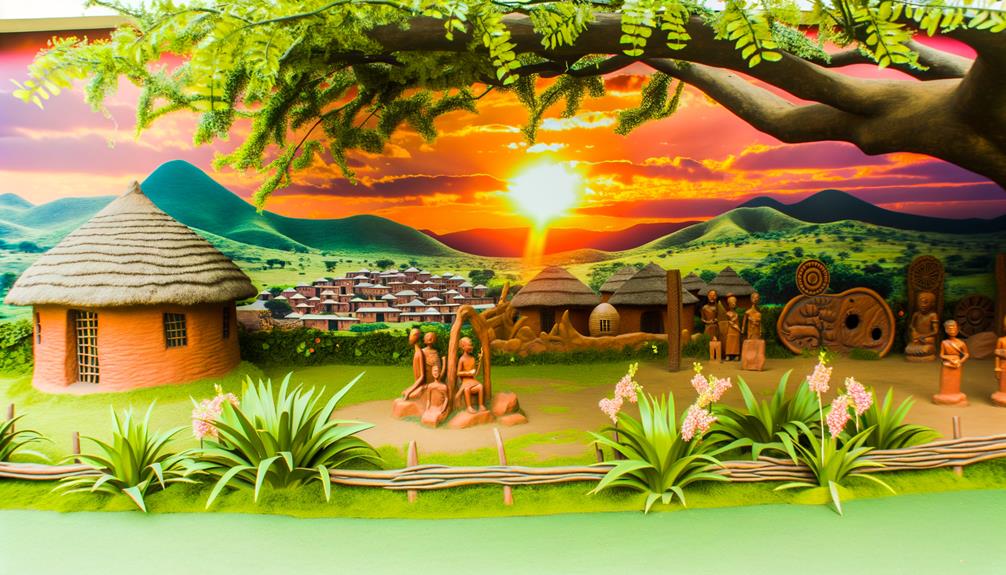Shona Name Meaning in English
Shona names, originating from the Bantu linguistic group of Zimbabwe's Shona people, hold deep cultural significance. They often reflect themes of unity, resilience, gratitude, and hope, symbolizing communal values and historical experiences.
Names like Tendai (gratitude) and Tariro (hope) embody cultural pride and resilience. Male names typically emphasize strength and leadership, while female names focus on beauty and nurturing roles.
This tradition provides insight into societal roles and collective ethos. Modern trends show a blend of indigenous roots and global influences, emphasizing the dynamic interplay of heritage and modernization.
Continue on to appreciate the intricate layers of Shona naming traditions.

Key Takeaways
- Shona names often reflect gratitude, hope, and resilience, embodying cultural values and beliefs.
- Names like Tendai and Tatenda express thankfulness and acknowledgment of blessings.
- Tariro and Ruvimbo are hopeful names symbolizing optimism and future aspirations.
- Strength and resilience are core themes, with names like Chaminuka and Nehanda reflecting fortitude.
- Modern Shona names blend traditional values with global influences, illustrating cultural dynamism.
Cultural Significance
The name Shona holds profound cultural significance, particularly within the context of the Shona people, an ethnic group native to Zimbabwe and parts of Mozambique. Revered as a central element of identity, the term 'Shona' unifies various subgroups, including the Zezuru, Karanga, and Manyika. It transcends mere nomenclature, encapsulating rich traditions, languages, and social structures.
Linguistically, it derives from the Bantu languages, reflecting a deep-rooted heritage that has endured through centuries. The Shona people are renowned for their intricate stone sculpture and mbira music, both of which symbolize broader cultural narratives. Therefore, the name Shona is not just an identifier but a repository of historical experiences, artistic expressions, and communal ethos that continue to shape contemporary identities.
Common Themes
The name Shona is commonly associated with themes revolving around unity, resilience, and artistic legacy. These themes are deeply ingrained in the cultural backdrop of the Shona people, reflecting their societal values and historical experiences. The name encompasses a diverse array of meanings that are fundamental to Shona identity.
Harmony: The name symbolizes a unified spirit, stressing the significance of community and togetherness.
Strength: It embodies fortitude and persistence, reflecting the Shona people's capability to endure challenges.
Creative Tradition: The name is frequently connected with cultural forms like music, dance, and artisanal skills.
Heritage Pride: It conveys a robust sense of pride in culture and the safeguarding of customs.
Together, these themes enrich the comprehension of the profound importance of the Shona name.
Names of Gratitude
In Shona culture, names of gratitude serve as profound expressions of thankfulness, often reflecting significant life events or divine intervention.
These names are imbued with deep symbolic meaning, encapsulating the cultural importance of acknowledging blessings and expressing appreciation.
Expressing Thankfulness Through Names
Shona culture often incorporates expressions of gratitude directly into names, reflecting a deep appreciation for life's blessings and the divine. These names serve not only as identifiers but also as enduring expressions of familial and communal values. The integration of thankfulness into Shona names can be seen through:
- Tendai – Meaning 'thank,' this name acknowledges divine intervention or assistance.
- Tatenda – Translating to 'we are thankful,' it signifies collective gratitude.
- Rumbidzai – Meaning 'praise,' it reflects an attitude of thankfulness through adoration.
- Maita – Translating to 'thank you,' this name directly expresses personal appreciation.
These names encapsulate profound cultural significance, reinforcing the importance of gratitude as a cornerstone in Shona society.
Symbolism of Gratitude Names
The incorporation of gratitude into Shona names not only reflects individual and collective thankfulness but also symbolizes deeper cultural narratives and values. These names often embody a family's reverence for divine intervention or ancestral blessings.
For instance, names like 'Tendai' (Thank) and 'Tatenda' (We are thankful) articulate an acknowledgment of life's fortunes, be they health, prosperity, or successful childbirth. Such names serve as enduring reminders of the interconnectedness between the living and the spiritual domain.
Moreover, gratitude names foster communal harmony by reinforcing positive social values and shared heritage. They are not merely personal identifiers but also cultural artifacts, encapsulating the essence of Shona spirituality, community bonds, and the perpetual appreciation for the benevolence received.
Names Reflecting Hope
In Shona culture, names reflecting hope are emblematic of the community's resilience and optimism. These names, such as Tariro (hope) and Ruvimbo (faith), carry profound cultural significance, often symbolizing aspirations for a better future.
Modern naming trends continue to embrace these hopeful meanings, underscoring their enduring relevance in contemporary society.
Popular Hopeful Names
Numerous Shona names encapsulate the essence of hope, reflecting cultural values and beliefs deeply embedded in the Zimbabwean heritage. These names are more than mere identifiers; they carry profound messages of optimism and future aspirations.
Here are four popular Shona names that convey hope:
- Tariro – Meaning 'hope,' this name symbolizes an optimistic outlook toward the future.
- Ruvimbo – Translating to 'faith,' it represents trust and confidence in better days ahead.
- Mufaro – Meaning 'joy,' this name signifies happiness and positive anticipation.
- Nyasha – Translating to 'grace,' it reflects the belief in divine favor and benevolence.
These names are imbued with a sense of promise, shaping individual identities with cultural significance and hopeful expectations.
Cultural Significance
Shona names that reflect hope serve as cultural anchors, embodying the community's shared values, aspirations, and historical experiences.
These names are not merely identifiers but encapsulate profound optimism and resilience, often derived from significant historical events and spiritual beliefs. For instance, names like Tariro (Hope) and Ruvimbo (Faith) are imbued with aspirations for a positive future, reflecting the collective spirit of endurance and expectation.
They symbolize a deep-seated belief in better times ahead, despite past adversities. Moreover, these names play a pivotal role in preserving cultural narratives, ensuring that the values and experiences of ancestors are perpetuated through generations.
Modern Trends
Reflecting the enduring cultural significance of Shona names, contemporary naming practices continue to emphasize hope, with modern variations and new names emerging to encapsulate the community's evolving aspirations and resilience. This trend is deeply rooted in the Shona tradition of bestowing names that convey profound meanings and hopes for the future.
- Tariro: Meaning 'Hope,' this name symbolizes optimism and a forward-looking attitude.
- Ruvimbo: Translating to 'Faith,' it reflects trust in better days and unwavering belief.
- Tendai: Meaning 'Give thanks,' it signifies gratitude and a hopeful outlook.
- Simba: Translating to 'Strength,' it embodies the resilience and determination to overcome challenges.
These names exemplify the Shona community's dynamic response to contemporary challenges, maintaining cultural relevance while fostering hope.
Strength and Resilience
In what ways does the name Shona encapsulate the essence of strength and resilience within its cultural and linguistic context?
The name Shona, often derived from the Bantu-speaking people of Zimbabwe, embodies a profound sense of fortitude and endurance. Linguistically, the name echoes attributes such as steadfastness and tenacity.
Culturally, it reflects a lineage of overcoming adversity, as the Shona people have historically navigated colonization, socio-political upheaval, and economic challenges.
The name serves as a tribute to their unyielding spirit, symbolizing an intrinsic resilience that is passed down through generations.
It is this confluence of linguistic precision and cultural significance that makes the name Shona a powerful emblem of strength and resilience in its native context.
Historical Names
Throughout history, the tradition of bestowing names within the Shona culture has been deeply intertwined with the community's values, historical events, and ancestral heritage. Names often serve as a repository of collective memory, reflecting pivotal moments and societal norms.
To understand their historical significance, consider the following:
- Chaminuka – Named after a legendary spirit medium, signifying guidance and foresight.
- Nehanda – Reflects the legacy of Mbuya Nehanda, a revered spiritual leader and symbol of resistance.
- Tichatonga – Meaning 'we shall rule,' this name echoes aspirations of sovereignty and self-governance.
- Tendai – Derived from the word 'thank,' it embodies gratitude, often bestowed in prosperous times.
These names encapsulate enduring narratives and cultural ethos, providing profound insights into Shona heritage.
Modern Trends
Amidst the evolving landscape of contemporary Shona society, modern naming conventions increasingly reflect a blend of traditional values and global influences. This synthesis manifests in names that integrate indigenous linguistic roots with elements drawn from English and other international languages.
For instance, names such as 'Tendai' (meaning 'thankful') coexist with modern adaptations like 'Blessing' or 'Hope.' This trend underscores a broader cultural shift where identity is increasingly cosmopolitan yet remains anchored in ancestral heritage.
Additionally, urbanization and increased access to global media have facilitated this hybridization, making it common for Shona names to carry both cultural resonance and global appeal. Consequently, modern Shona names embody a dynamic interplay of heritage and contemporary global connectivity.
Gender-Specific Names
Gender-specific names in Shona culture often carry profound meanings and reflect deeply rooted societal roles and expectations. These names are imbued with cultural significance, often providing insight into the community's values and historical context.
Masculinity and Strength:
Male names frequently emphasize strength, leadership, and protection. Examples include 'Simba' (power) and 'Takunda' (we have overcome).
Femininity and Nurturance:
Female names often highlight beauty, nurturing, and familial bonds. Examples include 'Rudo' (love) and 'Nyasha' (grace).
Ancestral Reverence:
Both male and female names may honor ancestors, reflecting respect and continuity.
Spiritual Connection:
Names can signify divine favor or spiritual aspirations, such as 'Tendai' (thankful) and 'Anesu' (God is with us).
Understanding these names offers a window into the Shona people's cultural and social fabric.
Unique Examples
Building on the understanding of gender-specific names, a closer examination of unique Shona names reveals a rich tapestry of meanings and cultural narratives.
For instance, the name 'Tendai' translates to 'give thanks,' reflecting a cultural emphasis on gratitude.
Another example, 'Ropafadzo,' meaning 'blessing,' showcases the importance placed on divine favor.
Names like 'Kudzai,' which means 'respect,' underscore the value of reverence within the community.
Additionally, 'Mudiwa,' translating to 'beloved,' highlights the deep interpersonal connections cherished in Shona culture.
These names are not merely identifiers but encapsulate significant cultural values and beliefs. By understanding these unique examples, one gains deeper insights into the intrinsic connection between language, identity, and cultural heritage in the Shona community.
Conclusion
The study of Shona names reveals a rich cultural tapestry, encompassing themes of gratitude, hope, strength, resilience, historical significance, and modern trends. These names are not mere labels but encapsulate profound meanings and societal values.
How do these names continue to reflect and shape the identity of the Shona people in contemporary times?
The enduring legacy of Shona names underscores their pivotal role in cultural continuity and identity, bridging past and present.






